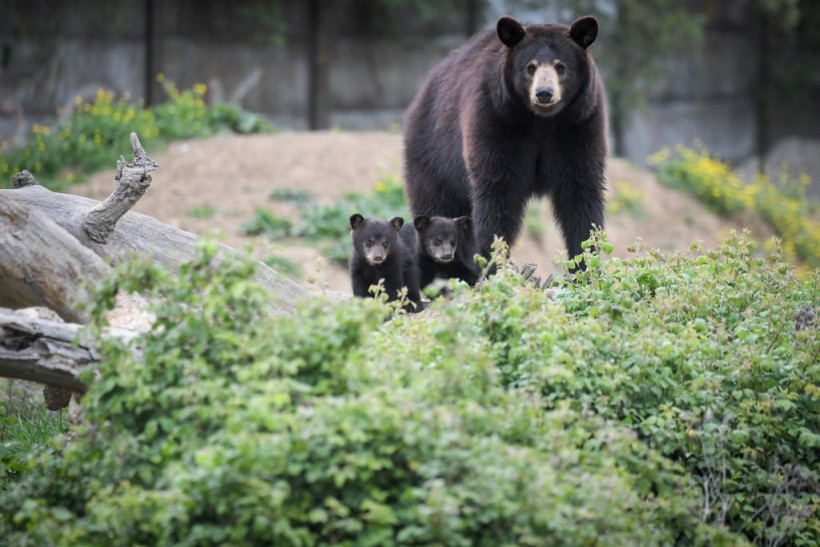
A scenic route in the NC Parkway is closed off temporarily after a visitor handled a black bear cub.
The scenic route through the park was temporarily closed when a tourist forcibly held a black bear cub in North Carolina's Parkway.
NC's Parkway Scenic Route Temporary Closure
An eight-mile stretch of the beloved Blue Ridge Parkway in Asheville, North Carolina, closed on October 30, shrouding its scenic beauty from eager explorers until further notice.
This closure, prompted by unsettling incidents involving a black bear, originated at the Lane Pinnacle Overlook, where visitors had recklessly interacted with a young bear, approximately 12 miles northeast of downtown Asheville.
The closure spans from Milepost 367.6 near the Craggy Gardens Picnic Area to Milepost 375.6 at Ox Creek Road, safeguarding park visitors and the bear alike.
Parkway Superintendent Tracy Swartout emphasized the dangers of luring bears with food, necessitating this precautionary measure.
Park officials hoped the bear will lose interest in the area, averting potential harm to visitors or the bear itself.
During this closure, the Craggy Gardens Visitor Center at Milepost 364.5 remains inaccessible, while intrepid travelers can access the Craggy Gardens recreational area via North Carolina 80 from the north.
The Blue Ridge Parkway, spanning 469 miles from Shenandoah National Park in Virginia to Great Smoky Mountains National Park in Cherokee, captivated 15.7 million visitors in 2022.
October, a prime month for fall foliage enthusiasts, typically draws around 2 million admirers, showcasing nature's vibrant tapestry along this unparalleled route.
Bear Behavior During Fall Season
In the fall, bears enter a crucial phase known as hyperphagia, where they intensely feed to store energy for the lean winter months.
Special Project Biologist Ashley Hobbs from the North Carolina Wildlife Resource Commission explained that during this time, bears dedicate about 20 hours a day to eating and can consume approximately 20,000 calories daily.
From September to November, they actively search for natural food sources but won't hesitate to raid human-provided foods when available.
Accessible food sources like unsecured garbage, pet food, or birdseed can be irresistible to these hungry bears as they prepare for winter, often leading to conflicts with people.
It's a period when their insatiable appetite puts them at odds with the human presence in bear habitats.
Also Read: Bear Sighting in Disney Theme Park Shuts Down Rides, Florida Wildlife Officials Spring to Action
Bear Safety
Bear attacks are relatively rare, as most bears are motivated by protecting their food, cubs, or territory.
To handle such situations effectively, mental preparedness is essential, although the appropriate response can vary depending on the bear species.
For instance, when facing brown or grizzly bears, playing dead may be the correct approach, but this is the wrong strategy when encountering a black bear.
In the event of a bear attacking inside your tent or stalking you before an attack, the crucial advice is unequivocal: DO NOT play dead but think quickly and fight back.
While such attacks are infrequent, they are often severe, signifying that the bear views you as potential prey.
Carrying bear pepper spray is a wise precaution when exploring the backcountry. This specialized deterrent is intended for use against aggressive, charging, or attacking bears and differs from human pepper spray.
It is vital to choose an EPA-approved product designed for bear deterrence and not apply it to your body or equipment.
Always consult with your national park authorities to confirm if bear pepper spray is recommended or permitted for your planned activities.
Related Article: Recent Sea Lion Harassment by Tourist Shuts Down Popular San Diego Beach for 7 Years
© 2024 NatureWorldNews.com All rights reserved. Do not reproduce without permission.

![Tsunami Hazard Zones: New US Map Shows Places at Risk of Flooding and Tsunamis Amid Rising Sea Levels [NOAA]](https://1471793142.rsc.cdn77.org/data/thumbs/full/70325/280/157/50/40/tsunami-hazard-zones-new-us-map-shows-places-at-risk-of-flooding-and-tsunamis-amid-rising-sea-levels-noaa.jpg)



